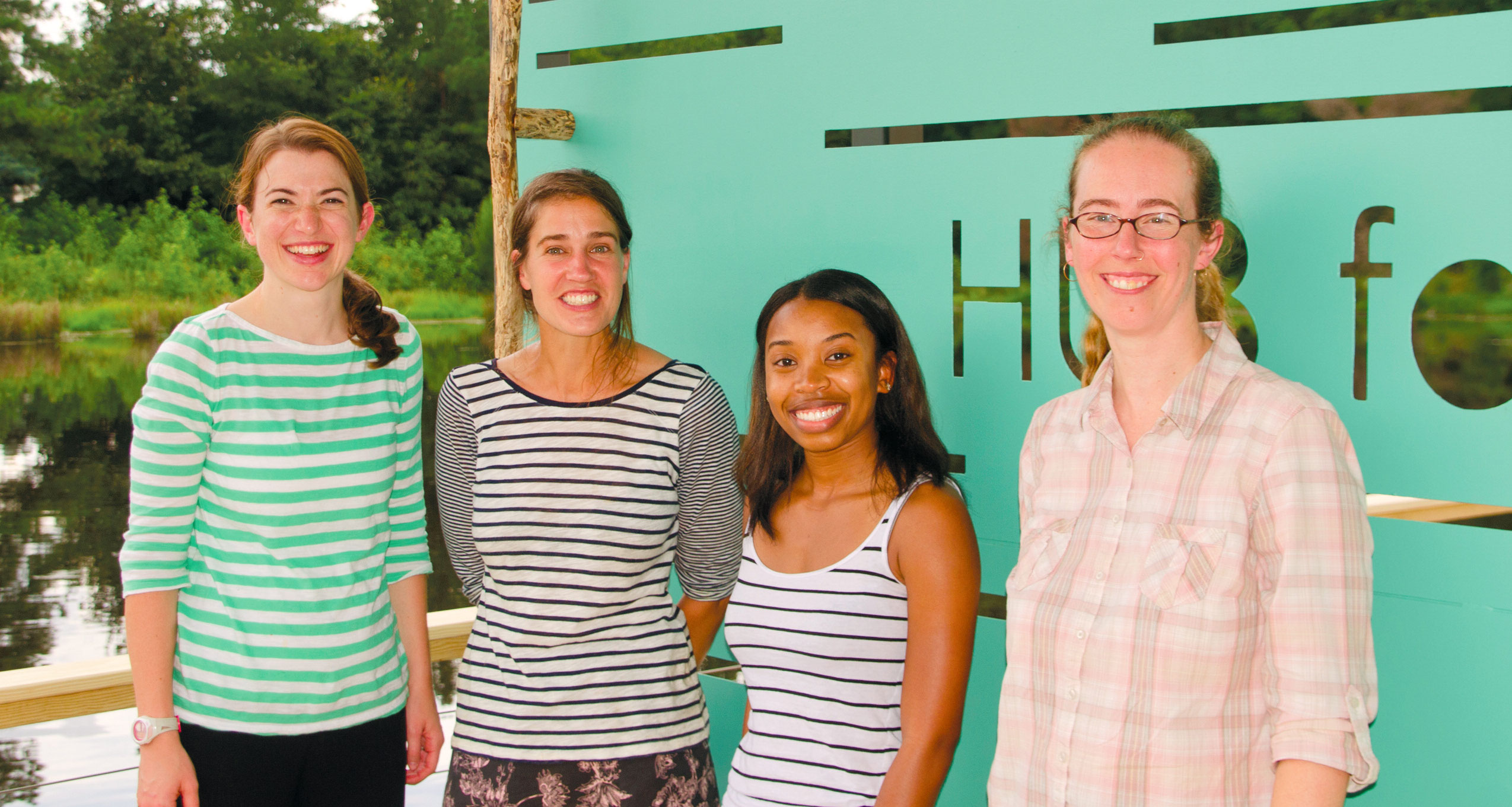Growing Minds: Hub School Farm in Durham
While school was out for the summer, Araucana chickens kept the grassy field behind Durham's Eno Valley Elementary loud and lively. They are the first residents at Hub Farm, a collaborative project that aims to connect Durham Public School students and teachers, and the Triangle community, with a local food system.
Hub was instigated a few years ago when a parent from Eno Valley, Sheldon Lennon, inquired about the empty land behind the school–32 acres of tall grasses, ponds, and trees, with an overgrown barn in the center–and suggested that the acreage be used for agricultural purposes. Its official "vine cutting" opening ceremony took place in October 2012.
Today, in addition to chickens, there are rows of greens and flowers, fig and pear trees, an entry garden, and a walking trail. But as Rick Sheldahl, head of career and technical education at nearby Northern Durham High School, is quick to emphasize, that's just the start for Hub.
"We are still in the very baby stages," Sheldahl said. "The potential of it is limitless. That 32 acres can provide so much more than what's there just in that place." Currently, what's there is changing almost daily–with the sprouting of new plants and the construction of new structures–aided by several community partners and participants.
A grant from the Greater Good Foundation–a non-profit established by Burt's Bees–provided funds to create a garden near Hub's entrance off Milton Road. The plot's purpose is to welcome visitors to the farm, and to foster and celebrate bees and pollination. In addition, funds from the BlueCross BlueShield of North Carolina Foundation supported the creation of trails around Hub, which can be used for a range of physical activities. An eventual goal is to install a low ropes course on the property.
Some of the biggest supporters have come from surrounding schools. Students from Southern High School constructed the chicken coop at Hub. The carpentry shop at Northern High School built picnic tables and new doors for the old barn, which will function as a classroom and storage space on the farm. N.C. State's College of Design has been working on a floating, covered dock, where students can meet or collect water samples from one of the property's two ponds. "It's a great lab for water monitoring and water quality," explained Katherine Gill, a designer and facilitator for Hub, who co-owns Durham-based Tributary Land Design + Build. Fundraising for the dock included launching a kick-starter campaign with a goal of $12,500.
Other collaborators include a group from UNC's Masters in Education program, who created décor for the walking trail (a "Where the Wild Things Are" sign hangs above the entrance). And students from the Eno after school program and the Durham Public School summer camp planted some of the first beds of lettuces, greens, beans, and sunflowers.
"It's connecting to all of the school systems," Gill said. Hub devised its name from a wheel, intending to extend itself like a spoke to an array of collaborators.
Several of those are right in Hub's backyard. The farm is within walking distance to Eno Valley Elementary, Carrington Middle, and Northern High, who reinstated its agricultural science program last year with a focus on biotechnology, environmental science, and urban farming. No student at any school is more than a 20-minute bus ride," Sheldahl said. "The property has the opportunity to reach a lot of kids in Durham County"–a goal established in the 2009 Durham County Agricultural Development and Farmland Preservation Plan. As it stated, "The education of Durham's young people will go a long way in determining whether the County cultivates its own next generation of farmers."
But Hub's influence isn't limited to students in the Triangle. For instance, Sheldahl has been in conversation with stakeholders from an 18-acre property in Charlotte who are trying to establish a similar venture. The Charlotte group includes several corporate sponsors, providing a different perspective as the two farms exchange ideas.
"That's the beauty of this project," explained Sheldahl. "It's bigger than one school. It's bigger than one subject." Already, Hub has made connections to curriculums in agriculture, carpentry, nutrition, environmental science, physical education, and culinary arts–to name a few.
As a working farm, another goal is to teach about business and marketing. Hub's organizers eventually hope to produce enough food to sell through a farmers' market or CSA, or to incorporate in school menus.
"We want to tie-in the whole economics of the food system and job creation," Gill said.
Perhaps Sheldahl said it best. "Hub's purpose is to empower students, no matter what their focus might be, and also to show them what can be done in a very small area with hand tools."





